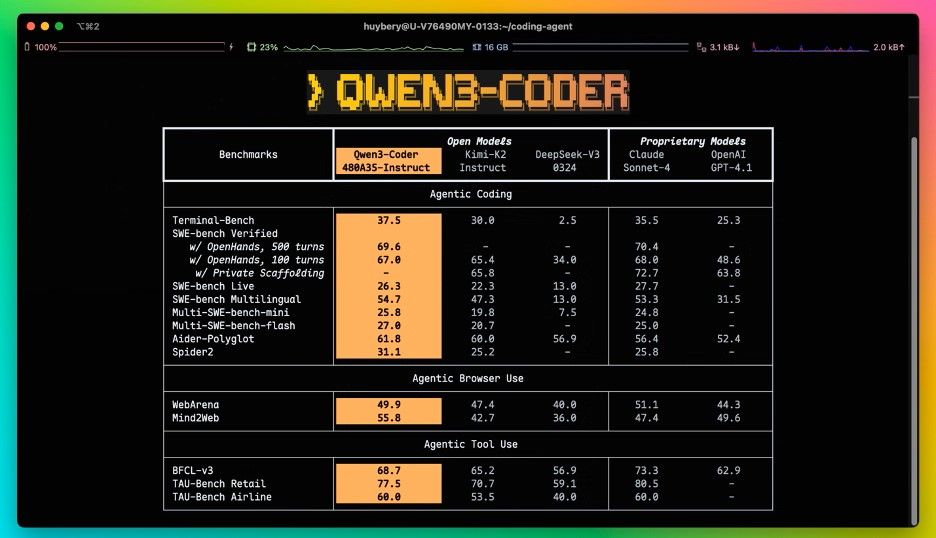A New Era for AI-Assisted Programming
The landscape of artificial intelligence applied to software development is undergoing a radical transformation. Alibaba has recently introduced a family of large language models that promises to redefine industry standards: Qwen3, with particular focus on the revolutionary Qwen3-Coder.
This release represents a significant step in the evolution of open-source AI models, positioning itself as a viable alternative to the dominant proprietary systems in the automated programming market.
Qwen3's Technical Innovations: Three Models for Different Needs
The new generation of Qwen3 models is structured into three specialized variants, each optimized for specific use cases:
Qwen3-235B-A22B-Instruct-2507: The Enhanced General Model
This version represents the evolution of the base model, characterized by a Mixture-of-Experts architecture with 235 billion total parameters, of which 22 billion are simultaneously active. The model supports up to 262,144 input tokens, doubling the processing capacity compared to the previous version.
Qwen3-235B-A22B-Thinking-2507: The Complex Reasoning Variant
This specialized version integrates advanced reasoning capabilities, allowing the model to tackle complex problems through a structured analysis process. While performance positions at an intermediate level compared to proprietary reasoning models, it represents an important milestone for the open-source world.
Qwen3-Coder: The Future of Agentic Programming
The true protagonist of this release is Qwen3-Coder, a 480 billion parameter model with 35 billion active, specifically designed to excel in agentic programming tasks. It supports up to 1 million input tokens, enabling analysis of entire codebases in a single session.
Performance That Redefines Industry Standards
The results achieved by the new Qwen3 models are particularly impressive in reference benchmarks:
- Qwen3-235B-A22B-Instruct-2507 achieved best performance in 14 out of 25 tested benchmarks, surpassing established models like Kimi K2 and GPT-4o
- Qwen3-Coder demonstrated superiority over competing open-source models in all 13 benchmarks related to agentic capabilities
- In the SWE-bench Verified benchmark, which evaluates the ability to solve real-world software engineering problems, Qwen3-Coder achieved a 67% success rate
"Qwen-based models have already surpassed 20 million downloads globally, demonstrating the growing confidence of the developer community in open-source solutions."
Methodological Innovations: The Group Sequence Policy Optimization Approach
One of the most interesting aspects of the new Qwen3 generation lies in the methodological innovations adopted during the training phase. Alibaba's team developed a modified version of Group Relative Policy Optimization, called Group Sequence Policy Optimization (GSPO), which allowed optimization of model performance through advanced reinforcement learning techniques.
For Qwen3-Coder specifically, a training process was implemented on 7.5 trillion tokens, 70% of which consisted of code, followed by a reinforcement learning phase focused on multi-turn tasks with external tool usage.
Accessibility and Economic Impact
A distinctive element of Alibaba's strategy is the approach to accessibility. The models are released under Apache 2.0 license, ensuring free use for both commercial and non-commercial purposes. API access prices are competitive:
- Qwen3-235B-A22B-Instruct-2507: $0.70/$2.8 per million input/output tokens
- Qwen3-235B-A22B-Thinking-2507: $0.70/$8.4 per million input/output tokens
- Qwen3-Coder: $1 to $6 per million input tokens, $5 to $60 per million output tokens
Strategic Implications for the AI Market
The Qwen3 release represents a significant moment in the competitive balance of the AI sector. While US companies like OpenAI, Anthropic, and Google continue to dominate with their proprietary models, the Chinese open-source community is rapidly closing the technological gap.
This trend could accelerate innovation in the sector, pushing all players to invest more heavily in agentic capabilities and automated programming, sectors that represent the next frontier of applied artificial intelligence.
Integrated Development Tools: Qwen Code CLI
Beyond the models, Alibaba has released Qwen Code, a command-line interface that allows developers to delegate engineering tasks to AI using natural language. This tool, optimized with custom prompts and specific interaction protocols, fully leverages Qwen3-Coder's potential for real-world agentic programming.
Integration with the Claude Code interface further expands usage possibilities, making it easier for developers to execute complex programming tasks.
